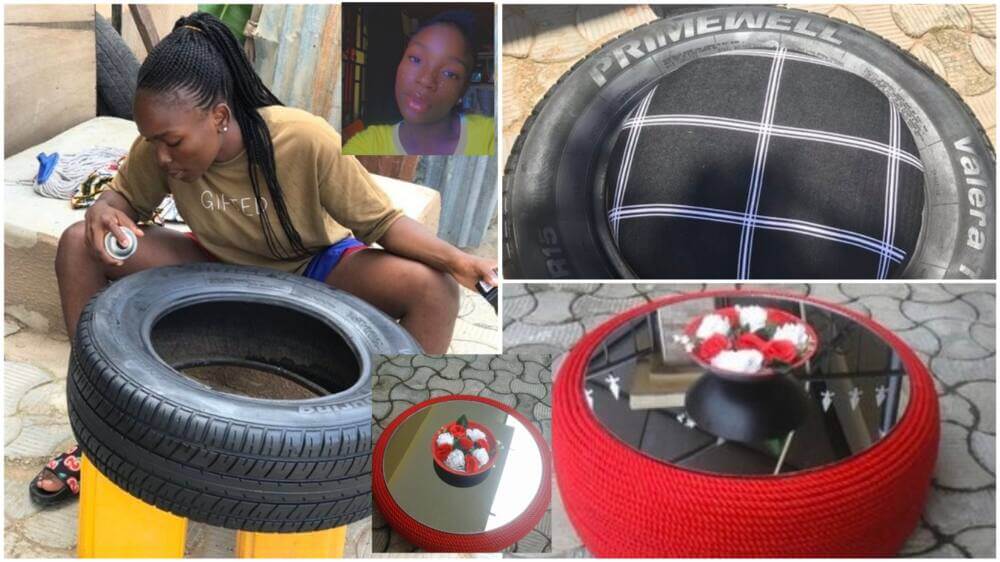The climate is in danger. But the United Nations is sinking billions of dollars to save it. Favour Oluma, in her own little corner, is helping to save the climate, even creatively, PELUMI BOLAWA reports
The recent 26th United Nations Conference of Parties on Climate Change in Scotland (October 31 to November 13, 2021) aims to address the fundamental issues of global warming and environmental degradation across the world.
Depletion of the ozone layer through the release of carbon into the atmosphere is the major cause of global warming. Stockpiling and burning of used tyres contribute to this problem. Rubber and plastic are non-degradable; so burying their waste is not an option. A study revealed that it takes hundreds of years for plastic to degrade; let alone rubber, which is more stubborn. As a panacea, experts recommend the 3Rs (Reduce, Reuse and Recycle) to reduce waste plastic and rubber littering the environment.
According to a report by the National Aeronautics and Space Administration, the earth’s global average surface temperature in 2020 tied with 2016 as the warmest on record.
“Continuing the planet’s long-term warming trend, the year’s globally average temperature was 1.840 Fahrenheit (1.020 Celsius) warmer than the baseline 1951 to 1980 mean. Year 2020 edged out 2016 by a very small amount, within the analysis’ margin of error, making the years effectively tied for the warmest year on record,” the report reads.
While many environmentalists advocate government policies and regulations to address these crises, some people are taking personal actions to reduce the challenge.
This is a story of Favour Oluma, who has not only found delight in what could have been a waste, but has also connected with nature to save the world, beautify homes and, more so, make a living.
Life
Favour Oluma is of the Idoma ethnic group, Agatu Local Council, Benue State. Born on March 11, 2000, she was raised in Gwagwalada, Abuja, and attends the Federal University of Technology, Minna. She is the Chief Executive Officer of Retyredglam, her startup, where she makes furniture out of used tyres.

Recounting her love for the climate, she told Financial Street, “I do not like the idea of burning tyres. For a lot of people, if they don’t throw away the tyre, they burn it. When we burn tyre, it emits carbon monoxide. Instead of burning tyres, I recycle them, to reduce the effect of burnt tyres on the environment,” said the Abuja-based entrepreneur.
Aside threatening the environment, smoke also threatens human health and public safety. The health challenges include cardiovascular illness, heart disease, nervous system, chest pain and high blood pressure. Smoke can also cause cancer and inflammation of mucous membranes.
Over 10 million tyres are discarded in Nigeria yearly, according to a report by Abuja Chamber of Commerce and Industry.
Favoured by COVID-19
The outbreak of the Coronavirus Disease, which affected Nigeria last year, was a tragedy to many people and economies and a blessing to some.
Following the outbreak, late 2019 in Wuhan, China, the world switched to a new norm of lockdown, when people started staying indoors to avoid physical contact with those that might have contracted the deadly virus. This mostly affected people on paid employment. Many lost their jobs due to redundancy and some others worked from home.
As schools across the globe shut down, some students started learning from home and others opted for learning a trade. Oluma was among the students, who decided to acquire a skill.
“I am very grateful for the lockdown. If there was no lockdown, I am not sure I would be doing this,” she said.
Inspiration
“I got a lot of inspiration from my family members. They are very supportive. I am happy working with them. My motivation level has not reduced. I still want to do more. I don’t let criticism affect my work. All I do is focus on what I love doing,” she told Financial Street.
Oluma is passionate about the UN’s Sustainable Development Goals, which serve as one of her inspirations in the course of her trade.
Market challenge
The Internet is one of the marketing platforms that Oluma use to showcase her business, but it didn’t come without its backlashes.
“Social media has helped me a lot. I got most of my clients are through the social media. Let me say, about 90 per cent of my clients are through the social media,” she affirmed.
The society will not but throw stones at you when you are stopping at nothing to achieve your goal. Oluma is not exempt. Initially, she was looked down at; first as a woman, and for seemingly not having what it takes to be creative in the manner she does.
Her words, “Most times, when I even post my works online, people doubt that they were done by me, except I show them videos. I lost a client because of this. She wanted me to make a dinning set for her, but was not sure I was the one creating the pieces. I tried convincing her, but she shut me off. That was how I lost the job.”
Among her challenges is the society’s stereotyping.
She disclosed, “I have had a lot of challenges. When I started, everybody was like, ‘It’s a man‘s job this one wants to do. Let her start, she will soon stop, because it is difficult.’ This cripples me.
“But I managed to do my first project because I have passion and I believe in myself. I just derive joy while working.”
Doing more…
Despite her challenges, Oluma is not relenting in her bid to scale up her business within Abuja and outside the Federal Capital Territory, into Lagos and Port Harcourt cities.
“I don’t have a workshop, so, it’s always very difficult for me doing my work at home,” she lamented. “Still saving up, by God’s grace, before the end of the year, I should get one. My plan is to get a workshop in Abuja first. Then get another workshop in Lagos. The three cities I am targeting now are Abuja, Lagos and Port Harcourt.”
One of the challenges that startups face in Nigeria is how to get funds to start a business, according to her.
“I think most of the challenges of entrepreneurs in Nigeria are their startup capital. Most of us don’t have a startup capital. It will be advisable if the government can loan some small businesses, so that they can scale up,” she said.
Solely bearing the torch
Favour Oluma lost her parents as a teenager. She lost her mother at the age of 12 and her dad when she was 20.
“It has not been easy. Growing up without a mom is very difficult. I usually feel very sad when I hear somebody say ‘my mom, my mom’. I didn’t get that opportunity. I lost her when I was 12. Life hasn’t been easy since the death of my mom. But I think I have got over that.
“For my dad – the only bedrock in my life and not that I don’t have siblings, because I don’t want to depend on anybody. I don’t want to call somebody that it’s time for my school fees and they would start telling me stories. I just thought I needed to do something. Though, I had the plans of doing this business before my dad died, I kept on procrastinating,” she regretted.
This young entrepreneur is not stopping at the level of her business; she is focused on expansion and has decided to enrol at a furniture school to improve on her design skill sets.
Get real time update about this post categories directly on your device, subscribe now.



